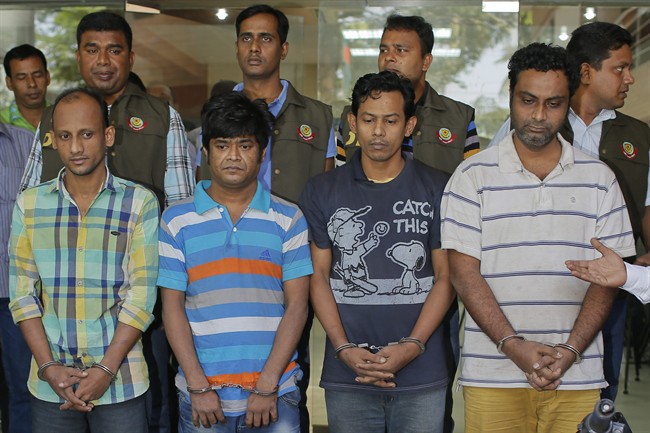DHAKA, Bangladesh – Police in Bangladesh have arrested four suspects in the killing of an Italian aid worker last month, and said Monday that the alleged gunmen had confessed to being hired to attack “a white man” in order to destabilize the impoverished South Asian nation.

Cesare Tavella was gunned down by motorcycle-riding assailants Sept. 28 while jogging in the diplomatic quarter of Dhaka, Bangladesh’s capital. Five days later, a Japanese citizen was killed in a similar attack in northern Bangladesh.
The killings spooked the country’s expatriate community and threatened its fragile economy, which is heavily reliant on foreign aid and a $25 billion garment industry supplying clothing for international brands.
Responsibility for the attack on Tavella was quickly claimed by the Islamic State group, but Bangladesh’s government rejected the claim and said there was no evidence that the extremist Sunni militant group had any presence in the country. It also rejected Islamic State claims for killing the Japanese man, and for the bombing of a Shiite procession over the weekend that left a teenage boy dead and more than 100 people injured.
Bangladesh has instead accused domestic Islamist militants along with Islamist political parties – specifically the opposition Bangladesh Nationalist Party and its main ally, Jamaat-e-Islami – of orchestrating the violence to destabilize the already fractious nation.
On Monday, Dhaka Metropolitan Police Commissioner Asaduzzaman Mia said the latest arrests supported that theory.
The suspects, including known professional killers identified from closed-circuit television footage from the attack site, allegedly told investigators they’d been hired by “a big brother” to kill Tavella in order to “create chaos” in the country, Mia said.
- Prince Harry won’t meet with King Charles during Invictus visit in London
- Canada repatriates 6 children of woman deemed security risk from ISIS camp
- Trump classified documents trial set for May start now postponed indefinitely
- Russia warns of nuclear weapon drills to ‘cool down’ West. Is it bluffing?
“We have identified that so-called big brother. When we are able to arrest that man, it will be clear who used them,” the police commissioner said.
Mia said that the attackers targeted Tavella simply because he was Caucasian. “Tavella was not their specific target, he just became a victim being a white,” Mia said. “The killers asked whether he had any enmity with that foreigner; he replied, ‘No, you have to kill a white man.”‘
The killers also said they’d received half of the payment promised for the attack, according to Mia, who did not specify any figures. “We have interrogated them separately. We need to interrogate them more, with permission from court,” he said.
The suspects were not involved in the assault on the Japanese man, Mia said. “That’s a separate group,” he said, without giving any details or saying whether authorities had any leads.
The arrests are considered a major breakthrough for Bangladesh, which has been struggling to stem a rising tide of violence, including the murders of four atheist bloggers claimed by radical Islamist groups this year.
Prime Minister Sheikh Hasina, a moderate who pledged to stamp out militant radical groups, on Saturday reiterated her stance of “zero tolerance” for terrorists. In recent years, she has overseen the arrest of dozens of suspected militants and the banning of six groups.
Experts say the crackdown has left some of the country’s more hard-line Muslims feeling alienated, and has led to a resurgence in activity by Islamic extremist groups. Last week, an email purportedly signed by the banned Ansarullah Bangla Team militant group and sent to Bangladeshi media threatened more attacks on atheist bloggers, as well as on working women and media that criticize “jihad.”

Comments